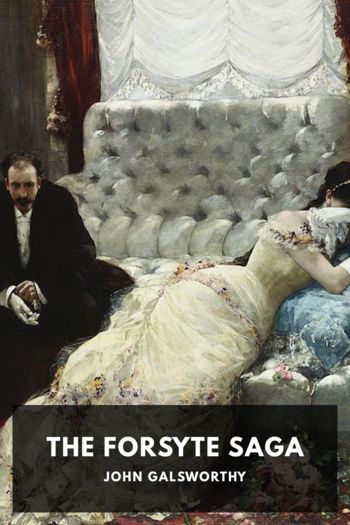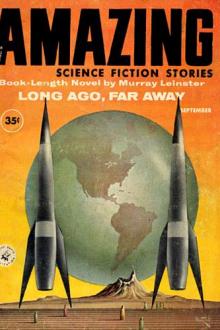The Forsyte Saga - John Galsworthy (best english novels for beginners .txt) 📗

- Author: John Galsworthy
Book online «The Forsyte Saga - John Galsworthy (best english novels for beginners .txt) 📗». Author John Galsworthy
Hesitating for just a moment, he nodded and went in. Since the death of his brother-in-law Montague Dartie, in Paris, which no one had quite known what to make of, except that it was certainly not suicide—the Iseeum Club had seemed more respectable to Soames. George, too, he knew, had sown the last of his wild oats, and was committed definitely to the joys of the table, eating only of the very best so as to keep his weight down, and owning, as he said, “just one or two old screws to give me an interest in life.” He joined his cousin, therefore, in the bay window without the embarrassing sense of indiscretion he had been used to feel up there. George put out a well-kept hand.
“Haven’t seen you since the War,” he said. “How’s your wife?”
“Thanks,” said Soames coldly, “well enough.”
Some hidden jest curved, for a moment, George’s fleshy face, and gloated from his eye.
“That Belgian chap, Profond,” he said, “is a member here now. He’s a rum customer.”
“Quite!” muttered Soames. “What did you want to see me about?”
“Old Timothy; he might go off the hooks at any moment. I suppose he’s made his will.”
“Yes.”
“Well, you or somebody ought to give him a look up—last of the old lot; he’s a hundred, you know. They say he’s like a mummy. Where are you goin’ to put him? He ought to have a pyramid by rights.”
Soames shook his head. “Highgate, the family vault.”
“Well, I suppose the old girls would miss him, if he was anywhere else. They say he still takes an interest in food. He might last on, you know. Don’t we get anything for the old Forsytes? Ten of them—average age eighty-eight—I worked it out. That ought to be equal to triplets.”
“Is that all?” said Soames, “I must be getting on.”
“You unsociable devil,” George’s eyes seemed to answer. “Yes, that’s all: Look him up in his mausoleum—the old chap might want to prophesy.” The grin died on the rich curves of his face, and he added: “Haven’t you attorneys invented a way yet of dodging this damned income tax? It hits the fixed inherited income like the very deuce. I used to have two thousand five hundred a year; now I’ve got a beggarly fifteen hundred, and the price of living doubled.”
“Ah!” murmured Soames, “the turf’s in danger.”
Over George’s face moved a gleam of sardonic self-defence.
“Well,” he said, “they brought me up to do nothing, and here I am in the sear and yellow, getting poorer every day. These Labour chaps mean to have the lot before they’ve done. What are you going to do for a living when it comes? I shall work a six-hour day teaching politicians how to see a joke. Take my tip, Soames; go into Parliament, make sure of your four hundred—and employ me.”
And, as Soames retired, he resumed his seat in the bay window.
Soames moved along Piccadilly deep in reflections excited by his cousin’s words. He himself had always been a worker and a saver, George always a drone and a spender; and yet, if confiscation once began, it was he—the worker and the saver—who would be looted! That was the negation of all virtue, the overturning of all Forsyte principles. Could civilization be built on any other? He did not think so. Well, they wouldn’t confiscate his pictures, for they wouldn’t know their worth. But what would they be worth, if these maniacs once began to milk capital? A drug on the market. “I don’t care about myself,” he thought; “I could live on five hundred a year, and never know the difference, at my age.” But Fleur! This fortune, so widely invested, these treasures so carefully chosen and amassed, were all for—her. And if it should turn out that he couldn’t give or leave them to her—well, life had no meaning, and what was the use of going in to look at this crazy, futuristic stuff with the view of seeing whether it had any future?
Arriving at the Gallery off Cork Street, however, he paid his shilling, picked up a catalogue, and entered. Some ten persons were prowling round. Soames took steps and came on what looked to him like a lamppost bent by collision with a motor omnibus. It was advanced some three paces from the wall, and was described in his catalogue as “Jupiter.” He examined it with curiosity, having recently turned some of his attention to sculpture. “If that’s Jupiter,” he thought, “I wonder what Juno’s like.” And suddenly he saw her, opposite. She appeared to him like nothing so much as a pump with two handles, lightly clad in snow. He was still gazing at her, when two of the prowlers halted on his left. “Épatant!” he heard one say.
“Jargon!” growled Soames to himself.
The other’s boyish voice replied:
“Missed it, old bean; he’s pulling your leg. When Jove and Juno created he them, he was saying: ‘I’ll see how much these fools will swallow.’ And they’ve lapped up the lot.”
“You young duffer! Vospovitch is an innovator. Don’t you see that he’s brought satire into sculpture? The future of plastic art, of music, painting, and even architecture, has set in satiric. It was bound





Comments (0)